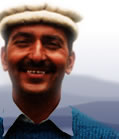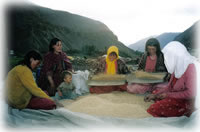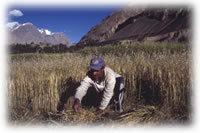 |
 |
||
 |
|||
|
RELATED THEMES employment and income festivals food security livestock OTHER LOCAL THEMES BACKGROUND |
agriculture
All of Shimshal's agricultural land is irrigated via one main irrigation channel which has numerous sub-channels. Irrigation channels are collectively constructed and maintained. Most of Shimshal's agricultural land is situated around the village, but there are also some fields located in the lower pastures above the village.
Livestock play an important role in the system of agriculture by producing fertiliser; several narrators explain how this fertiliser is prepared before being taken to the fields. Education, migration and the involvement of men in the tourism industry are all recognised as having an impact on agriculture, particularly in terms of the gender division of labour. Chughbai (Pakistan 13) explains, "This year almost all the men were engaged with the tourists and all the agriculture activities such as collection of fodder, food grain etc. were carried out by women…" Although tourism is a key source of income some narrators stress the continued importance of farming. One man explains, "I think agriculture is more profitable than tourism because tourism is seasonal…and is also dependent on the socio-political situation of the country. Whereas agriculture is like a fountain that gives a uniform flow all year round" (Pakistan 10). Several narrators also compare the freedom and independence of farming for oneself with the work of portering for others: "We are free to do things with our own will. While in working with tourists, you are simply servants. In farming you work hard and you enjoy [it]" (Pakistan 7). The importance of agriculture to the community is illustrated by the festival calendar. Most of the festivals celebrated in Shimshal mark certain points in the agricultural year or signify the beginning of key agricultural tasks. quotes about agriculture"…instead of timely watering of their fields they go on treks with tourists and the crops die for lack of water hence they get meagre production from their fields. If they work hard in their fields they would get more production and would not import foodstuff from down country… Farm work is profitable but demands more labour. Therefore people…prefer to [work as porters] in order to earn more money so that they can get tea and expensive clothes… I think agriculture is more profitable than tourism because tourism is seasonal…and is also dependent on the socio-political situation of the country." "Livestock play a vital role in getting optimal yield from our agricultural system, because yield depends upon the fertiliser and we get the fertiliser from the livestock. If we do not produce sufficient fertiliser we would not be able to get maximum production from our fields as we cannot transport the chemical fertiliser from the down country due to the unavailability of road… we can only rely on what we produce from our own resources." "Tapech (irrigating the crop field for the first time) and buteech (irrigating the field for the second time) are the most difficult tasks… In tapech the crop field is carefully planted and a small quantity of water is guided [through the infant crops] in such a way that all the plants are irrigated and no (infant) plant is de-rooted… Then for the second time the field is carefully watered and when the course is set for the watering…then there is no more difficulty for watering the fields." "As my father-in-law was a hunter and would often hunt game (ibex and blue sheep) we would eat meat every day. Soon I became fed up and I wanted to take vegetables… but he told me that nobody grows potatoes and other vegetables in Shimshal. It was a superstitious belief that the cattle would die if they grow potatoes. I was surprised to hear this and I argued with my father-in-law that Aunt Rehan grows potatoes and yet she possesses a lot of cattle; my father also grows potatoes and his cattle don't die… Ultimately I was able to convince my father-in-law…and we cultivated them and other vegetables in a small area just on a trial basis. The crop production was quite high and we started using the vegetables in our daily food, everyone in the house liked it. Over the year they also observed that nothing happened to the cattle… So the next year we grew vegetables on a larger area. In this way we started cultivating potatoes and vegetables in Shimshal." "At present, apricot is better than apple tree because it gives us dried apricots, wood, fodder, and oil, whereas apple is perishable and can neither be dried nor sold in the market…" "If we keep concentrating on Pamir it will continue to benefit us. Other than butter and qurut (local dried cheese), if we want, we can undertake agricultural activities there. We can obtain food grain from Pamir. Our ancestors were few in number but they continued growing crops in Pamir. If we maintain that tradition we can get more benefits. We have water mills there built by our ancestors. Rather than transport rations from Shimshal instead they would cultivate crops there and would grind the local production right there in the water mills." |
|
 Shimshal is one of the few communities in the Northern Areas of Pakistan which has sufficient agricultural and grazing land to produce enough food for its population. Such self-sufficiency has been crucial for survival, given its "remote" location. A few narrators talk proudly about this self-reliance and how in the past people managed without importing anything from down country.
Shimshal is one of the few communities in the Northern Areas of Pakistan which has sufficient agricultural and grazing land to produce enough food for its population. Such self-sufficiency has been crucial for survival, given its "remote" location. A few narrators talk proudly about this self-reliance and how in the past people managed without importing anything from down country. The main crops are wheat, barley, peas and potatoes. Apricot and apple trees and vegetables are also grown; apricots and certain vegetables are dried for use during the winter months. Potatoes are a relatively new crop for Shimshal and several narrators recall the introduction of these by women who married into the community from outside:
The main crops are wheat, barley, peas and potatoes. Apricot and apple trees and vegetables are also grown; apricots and certain vegetables are dried for use during the winter months. Potatoes are a relatively new crop for Shimshal and several narrators recall the introduction of these by women who married into the community from outside: